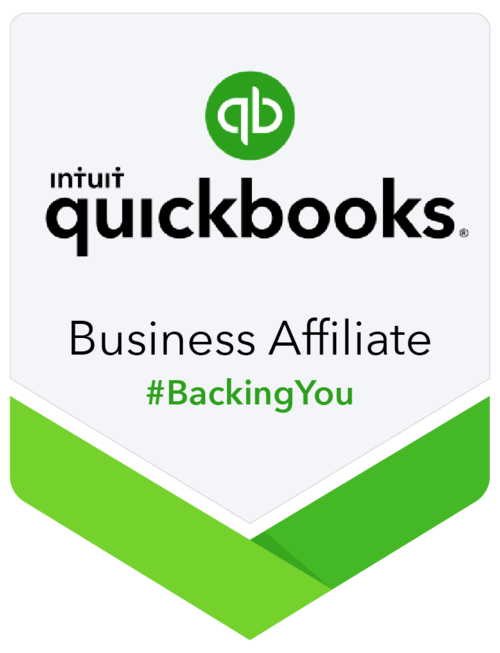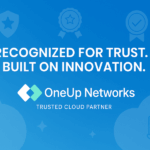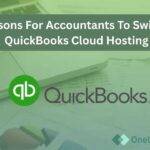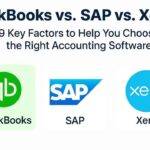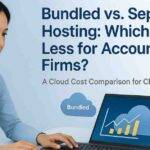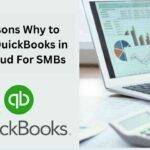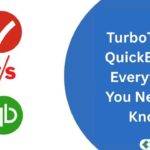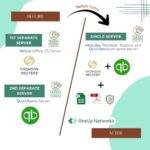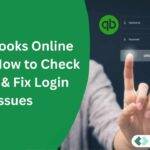In the era of digital transformation, businesses are increasingly adopting cloud-based solutions to enhance efficiency, accessibility, and collaboration. Moving QuickBooks, a popular accounting software, to the cloud can bring numerous benefits, such as real-time collaboration, improved data security, and the flexibility to access financial information from anywhere. In this article, we’ll guide you through the process of moving QuickBooks on the cloud, ensuring a smooth transition for your business.
There’s no one-size-fits-all in the cloud. OneUp Networks specializes in tailoring solutions to your needs. Whether public, private, or hybrid cloud, we’ll help you choose the model that aligns with your requirements and budget.
Step 1: Choose the Right Cloud Service Provider
Selecting the appropriate cloud service provider is a critical decision. QuickBooks Online is a cloud-native option that seamlessly integrates with various devices. Intuit Hosting offers the flexibility of the desktop version in a cloud environment, while third-party providers like AWS or Azure provide robust infrastructure. Consider factors like data security features, scalability, user support, and cost when making your decision. OneUp Networks prioritizes data protection and compliance. We guide you in implementing robust security measures and ensure that your cloud environment meets industry regulations.
Step 2: Back Up Your QuickBooks Data
Creating a backup is a crucial precautionary measure. QuickBooks Hosting provides built-in backup options, allowing you to save your data on local drives or cloud storage. Additionally, third-party backup solutions can offer more advanced features and additional security layers. Regularly schedule backups to ensure that your financial data is consistently protected.
Step 3: Choose a Migration Method
Understanding the available migration methods helps tailor the process to your business needs:
– QuickBooks Online: This cloud-native option offers simplicity and accessibility. Data is migrated seamlessly, eliminating the need for complex manual processes.
– Cloud Service Providers: For businesses with specific infrastructure needs, utilizing providers like AWS or Azure may be necessary. Consult with IT experts to ensure a smooth migration and ongoing support. Our team ensures minimal disruption to your operations during the migration process. We handle the technical details, so you can focus on what matters most—your business.
Step 4: Prepare Your QuickBooks Data
Data preparation is crucial to ensure a smooth transition. Clean up your Quick Books Hosting company file by removing redundant or outdated information. Verify the accuracy of your data and resolve any discrepancies. This step streamlines the migration process, preventing potential errors and ensuring data integrity.
Step 5: Notify Your Team and Users
Communication is key when implementing changes. Notify your team and users about the upcoming migration, providing clear instructions on how to access QuickBooks in the cloud. Share information about new login credentials and any changes in the workflow. This proactive communication minimizes disruptions and fosters a smoother transition.
Step 6: Continuous Monitoring and Improvement
Cloud navigation is an ongoing journey. We offer continuous monitoring and support to identify areas for improvement. Regular updates and enhancements ensure your cloud infrastructure evolves with your business.
Step 7: Test and Verify
Thorough testing is crucial post-migration. Verify that all data has transferred accurately and that users can access QuickBooks in the cloud without any hindrances. Test functionalities such as creating invoices, generating reports, and collaborating on financial tasks. Address any issues promptly to ensure a seamless transition. Equip your team with the knowledge to navigate the cloud effectively. OneUp Networks provides training sessions and ongoing support to empower your staff in managing and maximizing the benefits of your cloud environment.
Frequently Asked Questions:
1. Why should I move QuickBooks to the cloud?
Moving QuickBooks to the cloud offers benefits such as improved accessibility, real-time collaboration, enhanced security, and the ability to work from anywhere with an internet connection. It also ensures automatic updates and reduces the reliance on local hardware.
2. Can I still use the desktop version of QuickBooks if I move to the cloud?
Yes, you can. Intuit offers hosting services that allow you to access the desktop version of QuickBooks in a cloud environment. This provides the flexibility of the desktop version with the advantages of cloud access.
3. How do I choose the right cloud service provider for QuickBooks?
Consider factors such as data security, scalability, user support, and cost when selecting a cloud service provider. QuickBooks Online, Intuit Hosting, and third-party providers like AWS or Azure each have their advantages, so choose based on your specific business needs.
4. What data should I back up before migrating QuickBooks to the cloud?
It’s crucial to back up your entire QuickBooks company file, including financial data, customer information, vendor details, and any customizations you’ve made. Ensure that your backup includes all relevant files to prevent data loss during the migration process.
5. Can I continue using QuickBooks on multiple devices after moving to the cloud?
Yes, cloud-based solutions like QuickBooks Online provide multi-device accessibility. Users can log in from different devices with internet connectivity, enabling seamless collaboration and flexibility.
6. How long does the migration process take?
The duration of the migration process depends on factors such as the size of your QuickBooks data, the chosen migration method, and the efficiency of your internet connection. Generally, the process can take a few hours to a day.
7. Do I need to inform my team about the migration?
Yes, it’s crucial to inform your team about the migration in advance. Provide clear instructions on accessing QuickBooks in the cloud, share new login credentials if necessary, and offer training if there are changes to the workflow. This proactive communication helps minimize disruptions.
8. What happens if there are issues during or after the migration?
It’s common to encounter some issues during the migration process. QuickBooks often provides support resources, and third-party cloud service providers typically offer assistance. If you face challenges, reach out to customer support or consult with IT experts to address any issues promptly.
9. Can I revert to the previous version if the migration doesn’t go as planned?
It’s essential to have a backup before starting the migration. If any issues arise, you can restore your QuickBooks data from the backup to revert to the previous version. However, it’s advisable to consult with customer support or IT experts for guidance before attempting a rollback.
10. Will my custom reports and settings be preserved during the migration?
In most cases, custom reports and settings should be preserved during the migration. However, it’s crucial to double-check and ensure that all configurations are intact. If any issues arise, you may need to manually adjust settings in the cloud version.
Conclusion:
Moving QuickBooks to the cloud is a strategic decision that can revolutionize your business operations. Careful consideration of the cloud service provider, meticulous data preparation, and effective communication with your team are key elements in ensuring a successful migration. In the ever-evolving landscape of cloud technology, staying ahead is crucial. OneUp Networks remains your trusted partner, keeping you informed about the latest advancements and ensuring your cloud strategy aligns with future business needs.
Embark on your cloud journey with confidence. OneUp Networks is here to guide you at every step, ensuring a successful and rewarding navigation to the cloud. Let’s sail into the future together!








